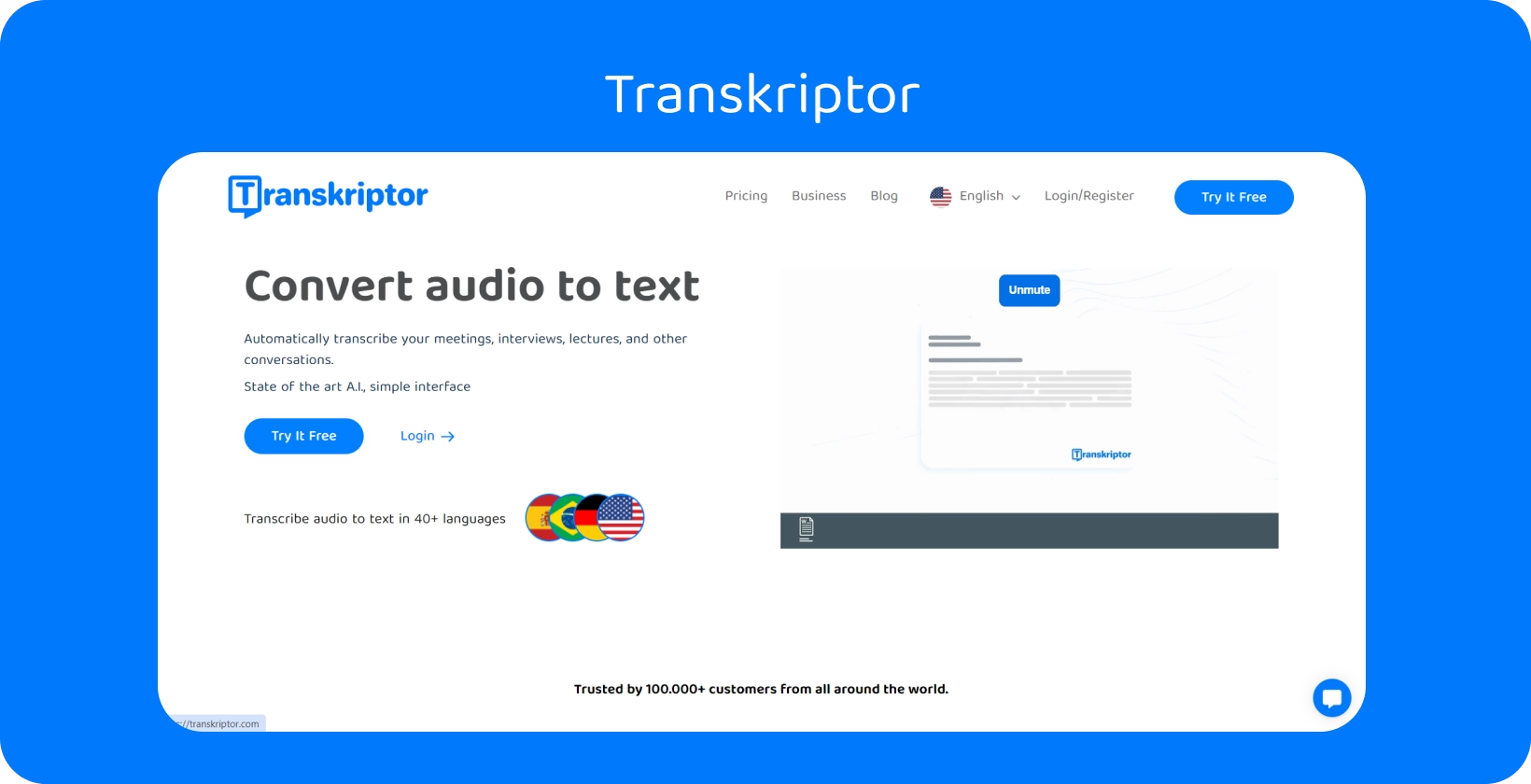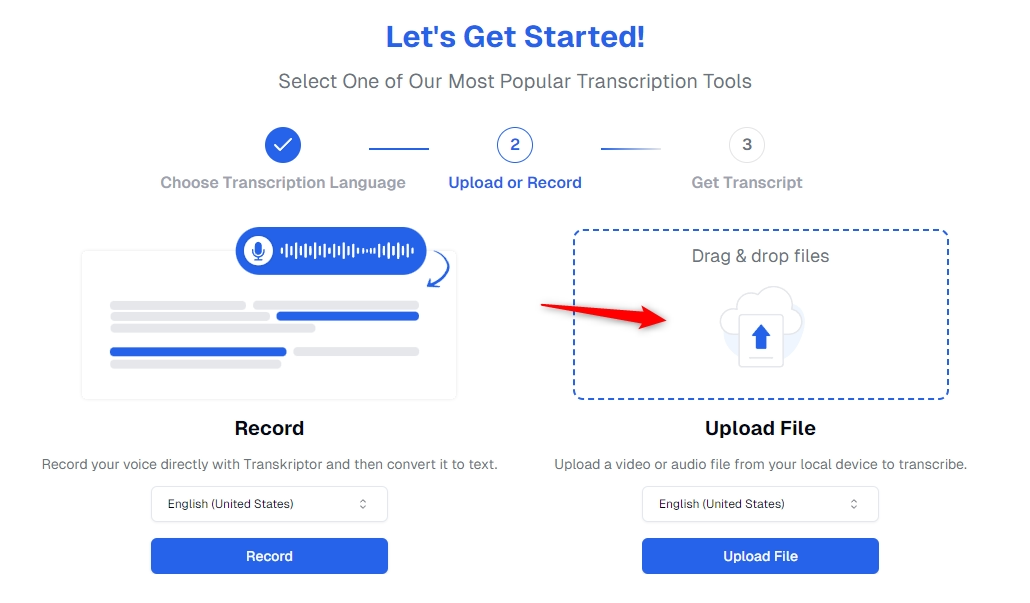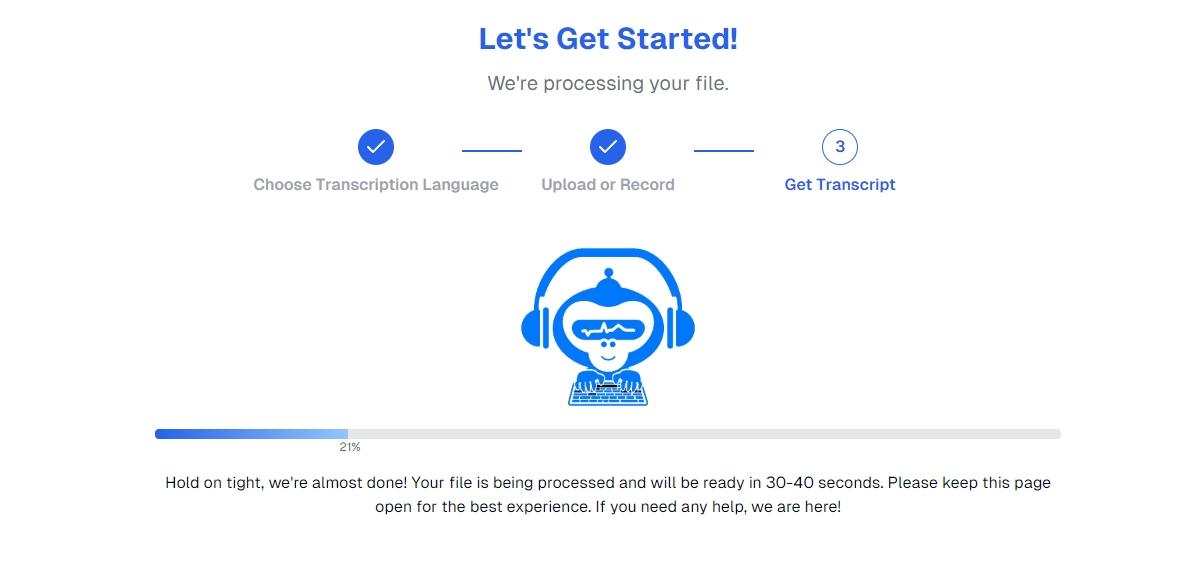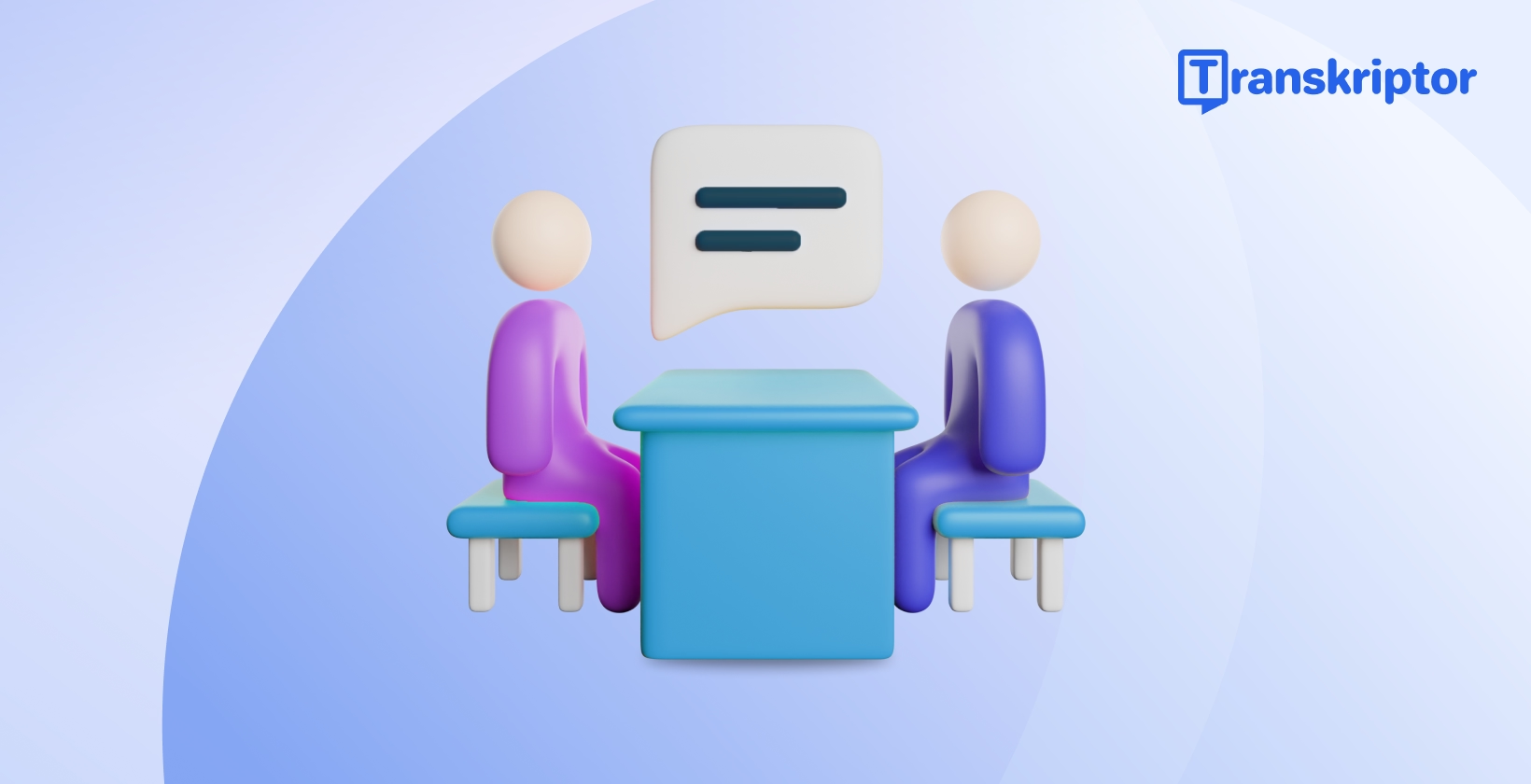Interviews are packed with valuable information. However, sifting through hours of interview recordings to find key insights is time-consuming. Worse, manually transcribing interviews takes even longer.
What if you could automatically transcribe interviews and get a summary of the key takeaways?
AI transcription tools transcribe interviews accurately and automatically generate summaries after interviews. Some tools even integrate into your Google Meets, Microsoft Teams meetings, and Zooms. You can even upload your footage and get a full transcription for meeting recordings.
Understanding the Importance of Transcribing Interviews
Interviewers can make the most of interviews by improving interview analysis with transcription. By transforming spoken words into written text, anyone can use that interview transcript as a valuable resource for research, analysis, and record-keeping.
What is an Interview Transcript?
An interview transcript is a written record of a spoken conversation. A good transcript faithfully represents the original audio or video recording.
That’s why interview transcripts are usually written in full verbatim, which means speech errors and non-verbal cues are included. It captures every word spoken during an interview, including questions, answers, pauses, and sometimes non-verbal cues like "um" or "ah."
This written format makes the content accessible, searchable, and easily shareable. It's a crucial step in turning raw interview data into actionable insights.
Why is Transcription Crucial for Research and Analysis?
The most crucial reason for transcription is accessibility. Converting video interviews into text makes it easier to access and search for information. You don’t have to skim through hour-long videos. Instead, you can find a keyword in seconds with a transcript. This makes the benefits of transcribing interviews incredibly clear.
Benefits of Transcribing Interviews for Qualitative Analysis
There is a wider range of benefits to transcribing aside from accessibility. Especially when it comes to researching and reporting. Transcription for qualitative analysis is one of the best ways to quantify interviews.
Enhancing Interview Analysis with Improved Clarity
Listening to recordings can be challenging, especially with background noise or multiple speakers. Transcripts provide a clear, written record, eliminating ambiguity and ensuring accurate interpretation of the spoken words. Researchers can easily reread sections, focusing on specific phrases or sentences without distraction.
Enhanced Detail Retention
Our memories are fallible. Even with careful note-taking, it's easy to miss subtle nuances or specific wording during an interview. Transcripts capture every detail, including pauses, hesitations, and changes in tone, providing a comprehensive record for analysis. This level of detail is crucial for identifying underlying themes and patterns.
Increased Focus
Analyzing audio or video requires constant concentration to follow the conversation. Transcripts allow researchers to step away from the recording and focus solely on the text. This allows for more focused and deliberate analysis, reducing cognitive load and improving the quality of insights.
It’s also a bad habit to be an interviewer while jotting down notes. If you’re interviewing someone, they deserve your full focus and attention. That’s another practical reason why AI transcribers can improve the quality of an interview.
Improving Accessibility and Sharing of Insights
Transcripts also improve the sharing of research findings. Other researchers or interviewers can skim through interview documents. Even use search functions like Ctrl + F (or Cmd + F on Macs) to find keywords.
Top AI Tools for Efficient Interview Transcription
There’s a variety of AI tools for interview transcription and they all excel at different things. Here are some of the leading options:
- Transkriptor: High accuracy (up to 99%), speed, affordable, and transcribes over 100 languages. Also has features like speaker identification, timestamps, and different transcript file formats.
- Otter.ai: For real-time transcription with video conferencing platforms. It also has speaker identification and end-of-meeting summaries.
- Sonix: Speaker diarization and sentiment analysis. For researchers who need to analyze what was said and the emotional tone of the conversation.
- Descript: Combines transcription with powerful audio and video editing capabilities. Ideal for projects where the transcript is directly integrated into a multimedia production.
- Rev: Human-powered transcription alongside AI options. Providing a choice for those seeking human-reviewed accuracy or faster turnaround times with AI.
How Transkriptor Stands Out Against Competitors
While each tool has its strengths, Transkriptor stands out in several key areas:
- Transkriptor delivers high-accuracy transcripts at a fraction of the cost. This makes it accessible to a wider range of users.
- Easy interface for uploading files, generating transcripts, and editing, even for non-technical users.
- Prioritizes data security, ensuring your interview recordings and transcripts are kept confidential.
In short, Transkriptor is laser-focused on providing affordable transcription. It’s the ideal choice for users who want accurate interview transcripts and nothing less.
Manual vs. Automated Transcription: Which is Better?
Manual transcription offers complete control but is time-consuming and prone to errors. Transcription for research interviews with tools like Transkriptor is significantly faster, often delivering transcripts within minutes of uploading the recording.
Here's a breakdown of the pros and cons:
Manual Transcription
Pros:
| Cons:
|
|---|
Automated Transcription
Pros:
| Cons:
|
|---|
Ultimately, AI transcription tools beat manual transcription in 99 out of 100 cases. Unless your audio has significant background noise with overlapping speakers. If your audio has lots of technical jargon and terminology, then AI transcription is the way to go.
Steps to Transcribe Interviews Efficiently
Efficient interview transcription starts long before you upload a file. Careful preparation and smart use of technology are key. Here’s how to streamline the process:
Preparing for Transcription: Tips for Recording Quality Audio

The quality of your audio recording is the foundation of an accurate transcript. These tips will help you capture clear audio.
- Invest in a Good Microphone: Using an external microphone, even a simple Lavalier or USB microphone, significantly improves audio quality compared to built-in laptop or phone microphones.
- Optimal Microphone Placement: Position the microphone close to the speaker(s) without being too close (about 6-12 inches is usually good).
- Do a Sound Check: Before the actual interview, record a short test to check audio levels and microphone placement. Adjust as needed.
- Choose a Quiet Environment: Minimize background noise by selecting a quiet room or location. Avoid areas with traffic, crowds, or echoing.
- Edit Audio If Necessary: For pre-recorded audio, use online audio editing tools to clean up the audio and remove background noise.
By following these tips, you can create high-quality audio recordings that will significantly improve the accuracy and efficiency of your transcription process.

Using Transkriptor: A Step-by-Step Guide
Transcribing your interviews with Transkriptor is a simple and efficient process. Here’s a step-by-step guide:
- Create an Account or Log In: Start by creating a free Transkriptor account or logging in if you're already a user.
- Upload Your Recording: Once logged in, you'll see a clear upload button. Simply drag and drop your audio or video file, or select it from your computer's files. Transkriptor supports a wide range of formats, including MP3, MP4, WAV, M4A, and more.

- Select the Language: Choose the language spoken in your recording from the dropdown menu. This is essential for accurate transcription, as Transkriptor's AI is trained in specific languages.
- Let Transkriptor Transcribe: After selecting the language, click the transcribe button. Transkriptor's AI will then process your file. The processing time depends on the length of your recording, but it's usually quite fast, often taking just a few minutes. You'll receive a notification when the transcription is complete in your email.

- Export and Share: Easily share the transcript link by clicking on the ellipses (...) button at the top right corner of your screen and selecting Share. You can also select download to export the transcript with 6 different options.

One cool Transkriptor feature is the AI Chat, where you can ask the AI questions about the transcription. This goes beyond AI summaries, allowing you to ask questions and get deep into what the transcription is about.
How Transcription Improves Accuracy and Analysis
Transcription significantly mitigates errors and improves the reliability of research data in several ways:
Minimizing Memory Bias
Human memory is fallible. Relying on recall or hastily scribbled notes during an interview can lead to inaccuracies, omissions, or biased interpretations.
Eliminating Interpretive Errors
When listening to recordings, researchers may inadvertently interpret spoken words based on their own biases or assumptions. A written transcript allows for careful and objective review, reducing the potential for misinterpretation.
Ensuring Data Completeness
Transcripts capture every spoken word, including pauses, hesitations, and interjections. This level of detail ensures data completeness, preventing researchers from missing subtle nuances or important contextual information that might be overlooked when listening to a recording.
Coding and Thematic Analysis
Transcripts make it much easier to code and analyze qualitative data. Researchers can directly annotate, highlight, and categorize themes and patterns within the text. This process is significantly more efficient than trying to code from audio or video recordings.
Improving Data Organization and Management
Transcripts can be easily organized, stored, and managed in digital formats. This makes it easier to compare data across multiple interviews, identify recurring themes, and track the progress of the research.
Supporting Data Integration with Other Sources
Transcripts can be easily integrated with other forms of data, such as survey responses or field notes, allowing for a more comprehensive and nuanced understanding of the research topic.
By addressing these key areas, transcription significantly enhances the accuracy, efficiency, and overall quality of qualitative research.
Factors to Evaluate in Transcription Tools
When evaluating transcription tools, consider these key criteria:
- Accuracy: This is paramount. Look for tools with high accuracy rates, especially if your audio has background noise, accents, or multiple speakers. Some tools offer accuracy guarantees or human review options.
- Speed: Turnaround time is crucial, especially for time-sensitive projects. AI-powered tools generally offer faster turnaround times than manual transcription.
- Language Support: Ensure the tool supports the language(s) spoken in your recordings. Some tools offer multilingual support, while others focus on a specific set of languages.
- Usability: A user-friendly interface is essential for efficient workflow. Look for tools with intuitive navigation, easy file uploading, and clear editing features.
- Pricing: Transcription services vary in cost. Consider your budget and the volume of transcription you require. Some tools offer free trials or tiered subscription plans.
- Integrations: Check if the tool integrates with other applications you use, such as Google Meet, Zoom, or other platforms. Transkriptorcan even integrates into your Google Calendar to automatically join and transcribe meetings.
- Security and Privacy: If your recordings contain sensitive information, ensure the transcription tool has robust security measures and adheres to privacy regulations.
- Speaker Identification/Diarization: If your interviews involve multiple speakers, look for tools that offer speaker identification or diarization features to automatically label different speakers in the transcript.
- Editing and Correction Features: Easy-to-use editing tools within the transcription platform are essential for correcting errors and refining the final transcript.
Key Considerations for Choosing a Transcription Method
Choosing a transcription method often involves balancing cost, speed, and accuracy. Here's a breakdown of the trade-offs:
Manual Transcription: Has the highest possible interview transcription accuracy, especially for challenging audio or highly technical content, but it's the most expensive and time-consuming option. Manual transcription is most suitable for
- Recordings with extremely poor audio quality.
- Interviews containing highly specialized jargon or complex terminology.
- Situations requiring absolute accuracy for medical, legal, or evidentiary purposes.
- Recordings with significant overlapping speech.
Ai Voice-To-Text for Interviews: Speed, accuracy, and affordability. AI tools can transcribe large volumes of audio quickly and accurately, making them ideal for most interview transcription needs. While AI may not achieve 100% accuracy in all cases, the time saved and cost-effectiveness often outweigh the need for minor edits.
Hybrid Approach (AI with Human Review): Some services offer a hybrid approach, using AI for the initial transcription and then having a human review and edit the transcript. This combines the speed of AI with the accuracy of human review, but it comes at a higher cost than pure AI transcription.
For most interview transcription needs, AI tools offer the optimal balance. However, as mentioned above, manual transcription is still valuable in specific situations where absolute accuracy, contextual understanding, or managing complex audio is paramount.
Conclusion
Getting the most from every interview is key. Whether you're a researcher, journalist, or business professional, transcription is essential for better accuracy, more effective analysis, improved accessibility, and easier teamwork.
As we've seen, relying on memory or notes isn't enough. That's where AI transcription tools like Transkriptor help. Transkriptor is fast, accurate, and affordable, making it easy to turn recordings into useful data.


